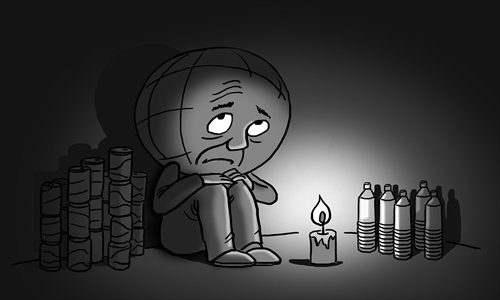Media should throw light into darkness of fresh rumors

Candle sales suddenly boomed last week in Shuangliu county, close to Chengdu, Sichuan Province. But it wasn't for menorahs or romantic dinners, but thanks to a bizarre rumor that the world was about to be plunged into darkness for three straight days!
The panic-buying sparked skeptical questions online. Some wondered whether people had yet used up the salt they bought last year in panic-buying after the Fukushima disaster, or the anti-flu tablets from the panic the year before last. And scientists pointed out that such a blackout would contravene the rules of nature.
But the candle buyers weren't alone. December 21 2012 is the purported date of the Mayan apocalypse, an idea which has a strange currency in China despite originating in California in the 1960s.
A woman in Jiangsu Province reportedly sold her house, borrowed money from her friends and donated it all to charity because she was firmly convinced that doomsday was about to come and she wanted to give her money for the poor to boost her own karma.
Apocalypse cults are not just a Chinese phenomenon. In 1997, Californian cult Heaven's Gate committed group suicide in anticipation of a world-ending comet. The comet didn't show, but then, nor will the supposed Mayan disasters.
A little research will show you that even the Mayans didn't believe in their own supposed doomsday. This December merely marks the end of another "Long Count," the way that Mayans reckoned calendar years. It has no more significance than the end of a Chinese 60-year zodiac cycle.
Even if the Mayans had believed in disaster, why should anyone give it any more credence than the other failed prophesies of doomsday in various cultures over the centuries?
So why do such rumors find willing buyers? Even if the content is different, the panic is similar every time. If it's a general awareness of threat, why do people drive drunk and jaywalk across traffic lights? The Mayan apocalypse rumors have found credence even among some students, said to be seriously stressed over the end of time.
On this issue, mass media, in particular traditional media, has an inescapable responsibility. One guide for survival in natural disasters is to take a radio with you.
Traditional media such as TV, radio, and newspapers are not only channels for communication of messages, but also they have a watchdog functions to guard the purity of the information flow and filter out false news, unlike new media like social networking services, which are more open.
At present, traditional media still have more coverage. Yet on the other hand they also need to better maintain their credibility. For instance, the prevalence of false advertising makes many skeptical, from magical cures to miraculously cheap computers.
In daily programs, the delivery of more up-to-date, objective and transparent news and analysis will definitely help people get closer to the truth. But that can't just apply to reporting on disasters.
One reason that rumors prevail is because of the damaged credibility of traditional media. In countries where the media is regularly subject to restraints imposed from above, with the interests of the authorities rather than the public in mind, people lose faith in it and seize on to stories that haven't been put through official filters. The media has to build credibility across the board.
If rumors prevail, the media also can take immediate action in response to people's confusion and panic. As one saying goes, a wise man does not believe in rumors.
The media can help us become more informed and wiser. Media can also track down the source of rumors and thereby explain the scheme behind them. If the people of Shuangliu discovered a candle factory needed to unload its stock, perhaps this panic wouldn't have happened.
The author is a TV producer based in Jiangsu Province. opinion@globaltimes.com.cn